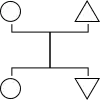Moiety (kinship)
In the anthropological study of kinship, a moiety (/ˈmɔɪəti/) is a descent group that coexists with only one other descent group within a society. In such cases, the community usually has unilineal descent (either patri- or matrilineal) so that any individual belongs to one of the two moiety groups by birth, and all marriages take place between members of opposite moieties. It is an exogamous clan system with only two clans.
| Look up moiety in Wiktionary, the free dictionary. |
| Part of a series on the |
| Anthropology of kinship |
|---|
 |
|
Social anthropology Cultural anthropology |
In the case of a patrilineal descent system, one can interpret a moiety system as one in which women are exchanged between the two moieties. Moiety societies operate particularly among the indigenous peoples of North America and Australia (see Australian Aboriginal kinship for details of Aboriginal moieties).[1][2][3]
References
- Tooker, E. (1971). "Clans and moieties in North America". Current Anthropology, 357–376.
- Parsons, E. C. (1924). "Tewa kin, clan, and moiety". American Anthropologist, 26(3), 333–339.
- White, I. (1981). "Generation moieties in Australia: structural, social and ritual implications". Oceania, 6–27.
Further reading
- "Moiety system - sociology". Encyclopedia Britannica.
This article is issued from Wikipedia. The text is licensed under Creative Commons - Attribution - Sharealike. Additional terms may apply for the media files.